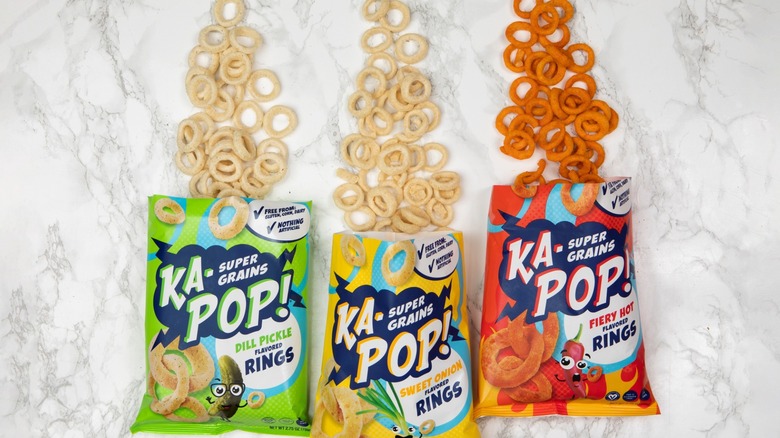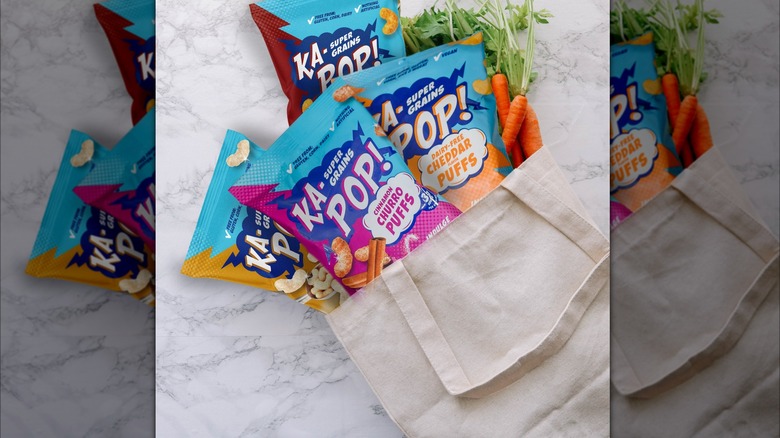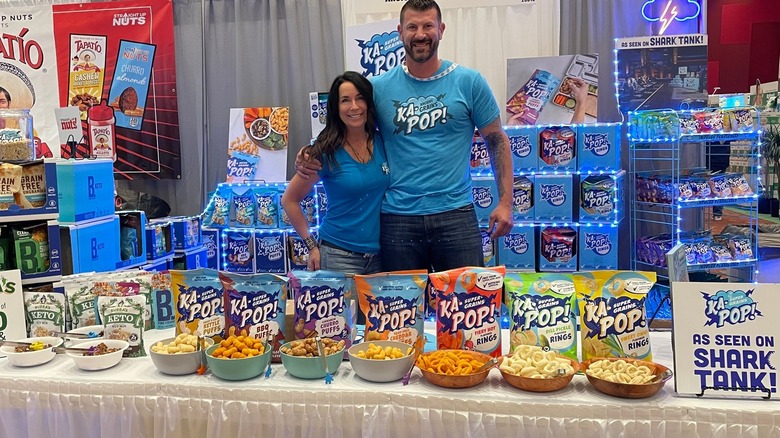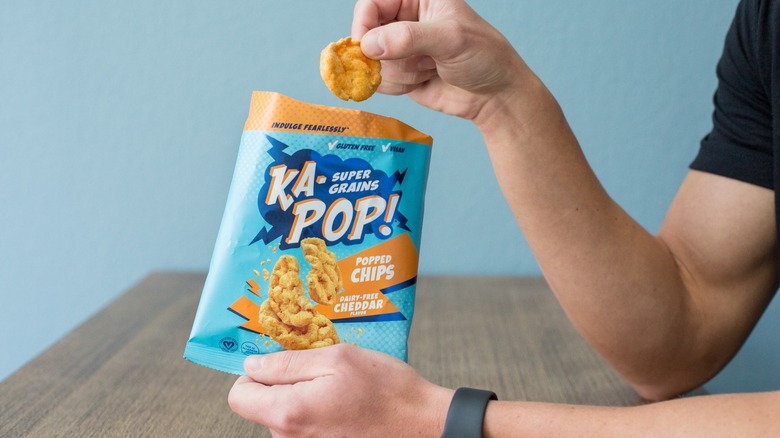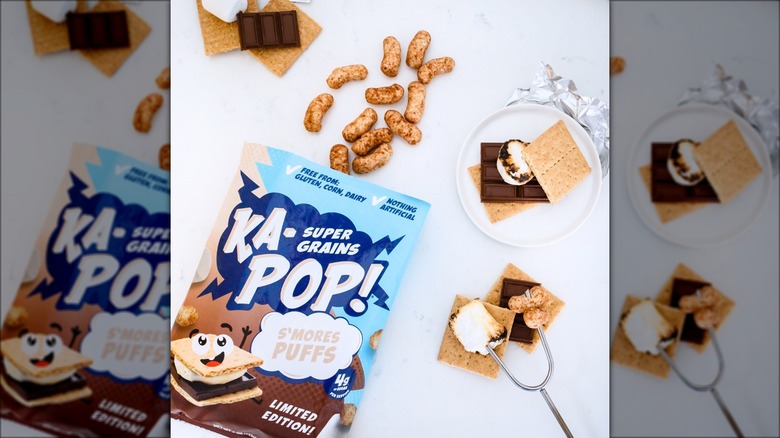Ka-Pop!: Here's What Happened After Shark Tank
Season 11 of "Shark Tank" was a great year for health food businesses. Fans were introduced to Coconut Girl's all-natural ice cream cookie sandwiches, a line of date-based vegan spreads from Wanna Date?, and bags of popped water lily seeds from Bohana. This was also the same season where viewers saw entrepreneur Dustin Finkel wearing a superhero cape while kicking, punching, and fighting the "bad guys" of the snacking world with his good-for-you popped chips, Ka-Pop!
Finkel was a former investment banker and had worked at companies like General Mills (where he claims he launched the first nationwide gluten-free product ever) before the idea for Ka-Pop! struck. He had been following a paleo diet for years and was always on the lookout for snacks that were both healthy and tasty enough to win even his kids' approval. Frustrated by the lack of anything on the market that fit the bill, Finkel turned towards his own pantry, which was always stocked with ancient grains, for a solution.
Several kitchen experiments and taste tests later, the entrepreneur found his snack in popped sorghum. He realized that sorghum puffed up like popcorn and was just as tasty to eat. More importantly, it was a quick hit among his kids. And so he began Ka-Pop! — a line of vegan, gluten-free, and non-GMO chips that were air-popped and free of any fillers besides cold pressed oil and seasonings.
What happened to Ka-Pop! on Shark Tank?
Dustin Finkel walked into Season 11, Episode 12 of "Shark Tank" in 2020 hoping to secure a $350,000 investment to help make Ka-Pop! a "true snacking superhero" at grocery stores. In return, he offered a 5% stake in the popped chip business, bringing the company's valuation to $7 million.
While the Sharks were amused by Finkel's theatrical pitch, it was the snacks that truly impressed them. "I've tried a lot of this GMO, no carb, yada yada yada — this is good. This is really good," exclaimed Shark Kevin O'Leary, and the rest of the panel wholeheartedly agreed. But taste alone isn't always enough to win the Sharks over, and they wanted to know what made Ka-Pop! a $7 million dollar business.
Ka-Pop! was on track to make $1.2 million during the year of filming, per Finkel, and he had previously raised $943,000. He also already had a panel of investors on board, which included prestigious names such as the former head of Whole Foods and the founder of Boulder Brands. This made the Sharks wonder whether there was even a need for them to take a stake in the company.
Four of the five Sharks backed out in quick succession, leaving Finkel with just O'Leary to negotiate with. O'Leary did make an offer but he wanted 17.5% of equity, which would bring Ka-Pop!'s valuation down to $2 million. Despite a lot of back and forth, O'Leary and Finkel could not find a way to meet in the middle, leaving Ka-Pop! without a deal.
Ka-Pop! after Shark Tank
Ka-Pop! may not have secured a deal on "Shark Tank," but it was by no means the end of the road for the company. In the weeks after filming, Finkel focused on ramping up production in anticipation of the much-awaited air date and the sales boost that it would bring. The entrepreneur had expected that Ka-Pop! would have its biggest sales month after the "Shark Tank" episode aired, but, in reality, it fared far better.
Ka-Pop! had more sales in the nine days after its "Shark Tank" episode aired than it had in the entire year prior. Finkel told National Sorghum Producers that, for a small business like his, an appearance on "Shark Tank" is as good as "a long-form Super Bowl commercial." In fact, there's a spike in sales each time Ka-Pop!'s episode re-airs — even years after the original air date in 2020.
The perks of being on "Shark Tank" go beyond sales and publicity, though. Finkel admitted that being an entrepreneur can be a lonely job sometimes, but getting such positive feedback from the Sharks gave him a personal boost. He also felt validated that he was on the right track with Ka-Pop! — investment or not. All-in-all, "the power of 'Shark Tank' is undeniable," Finkel firmly told Saporta Report.
Is Ka-Pop! still in business?
Not only is Ka-Pop! still in business, but it has only grown since appearing on "Shark Tank." Although founder Dustin Finkel never said where Ka-Pop! was being sold when the company appeared on the show, the snacks have since made their way to big-name retailers such as Sprouts, Wegmans, Whole Foods, and Kroger since. Fans can buy the popped sorghum chips on Ka-Pop!'s website as well, which also offers the option of monthly subscriptions.
Finkel also revamped Ka-Pop!'s packaging in brighter colors that made the company's messaging more clear, and rolled out new snacks, too. At the time of its appearance on "Shark Tank," Ka-Pop! had just four flavors of popped sorghum chips: vegan cheddar, rosemary garlic, olive oil and sea salt, and salt and vinegar. After the show, Finkel launched super grain puffs and super grain rings, and released new flavors such as churro, dill pickle, and sweet & salty.
That said, the company has gone through some changes. In March 2021, Ka-Pop! announced that it was merging with another healthy snack business, Bubba's Fine Foods under a new banner called Awakened Foods. Founded in 2014 by Jeff Schmidgal, Bubba's sells keto nut mixes, grain-free granola, and chips made from saba bananas. Awakened Foods was projected to make $10 million in annual sales by the end of that year.
What's next for Ka-Pop!?
Although neither Ka-Pop! nor Bubba's Fine Foods are particularly active on social media currently, fans can only assume a bright future for the merged companies. Ka-Pop! has rolled out plenty of limited-edition flavors in the past, including hatch green chile, s'mores, and pumpkin spice-flavored puffs, so it's likely that more will be launched in the future as well. It's also possible that Ka-Pop! might take more healthy snack brands under the Awakened Foods banner, coming out with more than just chips, puffs, and rings for snackers.
However, the company's founder might not be headed in the same direction. When Ka-Pop! and Bubba's Fine Foods merged, Finkel was set to be the new CEO and Schmidgall was to take on the role of COO. While the latter still continues to helm Awakened Foods, Finkel has taken a step back.
"I recently decided to step down from my role as CEO," Finkel wrote in a 2023 LinkedIn post, adding that it was "the hardest professional and personal journey I have encountered, and I have many mixed emotions about this decision." Although he is still a board member of Awakened Foods, Finkel now works as the Chief Commercial Officer of two Colorado-based businesses, KeJoy and Prime Plus Wagyu. He also serves as an adjunct professor at the University of Colorado, where he shares his knowledge of marketing and business management with budding students.

